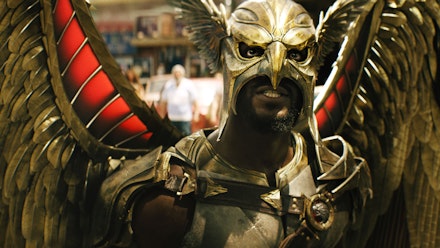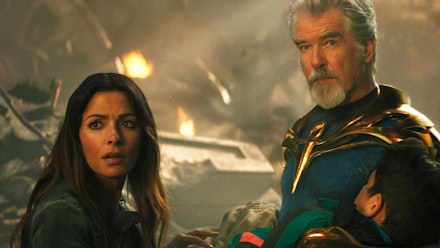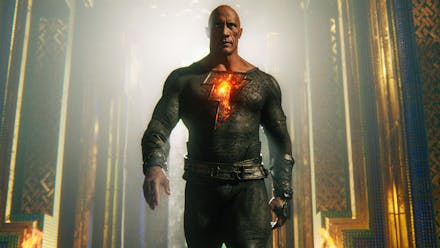The DC Film universe has, for nearly a decade now, been pinballing between the lightness of Shazam! or Wonder Woman and the grim violence of Batman v Superman. With Black Adam, Dwayne Johnson and director Jaume Collet-Serra attempt to offer a grand unified theory of DC, mixing family-film tropes with a protagonist who straight-up murders people. The result is sometimes a mess, but it’s a generally entertaining one.

As is traditional, a complicated prologue set in 2600 BCE introduces a superpowered hero who then disappears. Cut to the present day, and the vaguely scholarly freedom fighter Adrianna (Sarah Shahi) goes to visit an ancient tomb (as is also traditional). She reads out an inscription and whaddya know, lightning strikes to release Teth-Adam (Dwayne Johnson) to battle the enemies who threaten her, and their shared homeland of Kahndaq. Adam is so powerful, however, that soon Viola Davis’ Amanda Waller gets the Justice Society involved. They’re led by flying fighter Hawkman (Aldis Hodge) and magic user Doctor Fate (Pierce Brosnan), who bring newbies Atom Smasher (Noah Centineo) and Cyclone (Quintessa Swindell) to stop this new threat.

There’s never much doubt where all this is going. Black Adam clearly isn’t that bad, given how he bonds with Adrianna (a largely undeveloped character) and her likeable son Amon (Bodhi Sabongui). And the Justice Society, while rightly accused of only caring about Kahndaq’s plight when a superpowered being arises there, are clearly well-meaning. There’s obviously going to be a greater threat to come. But first Collet-Sera stages some fun, destructive action scenes to allow Adam and the Justice Society to strut their stuff in. Brosnan’s a standout: his powers are extremely Doctor Strange-y, down to the glass-shattering of reality, but he has a fatalistic sense of the future and a lightness of touch that feels fresh. The film also wisely doesn’t pretend that Black Adam is ever in much danger: it’s only a question of how angry he gets, and who's hit in the crossfire.
The film’s greatest strength, which runs like a current through it, is the sense that superpowers can be terrifying.
Still, that weird contradiction remains: Johnson, Collet-Serra and their team want edge, but without alienating family audiences. So you get massive action scenes without any obvious civilian casualties, and godlike powers without consequence. It’s all nicely shot in low-lying sun and dusty vistas, but it suffers from the weightlessness that gives superhero movies their bad name: great power, no responsibility.
The film’s greatest strength, which runs like a current through it, is the sense that superpowers can be terrifying. Johnson, far stiller and more stony-faced than usual, shows a sort of bemused amorality, and his killing of bad guys seems as natural as breathing during his impressive introductory scenes. The idea of a superhuman who fights for his oppressed people is also a solid one, and an interesting challenge to the usual small-c conservative superheroes who just save a few individuals from baddies. Black Adam may not make his world better, not yet, but he shows the potential to shake up the DC Universe in ways that may yet succeed in uniting its disparate elements.








